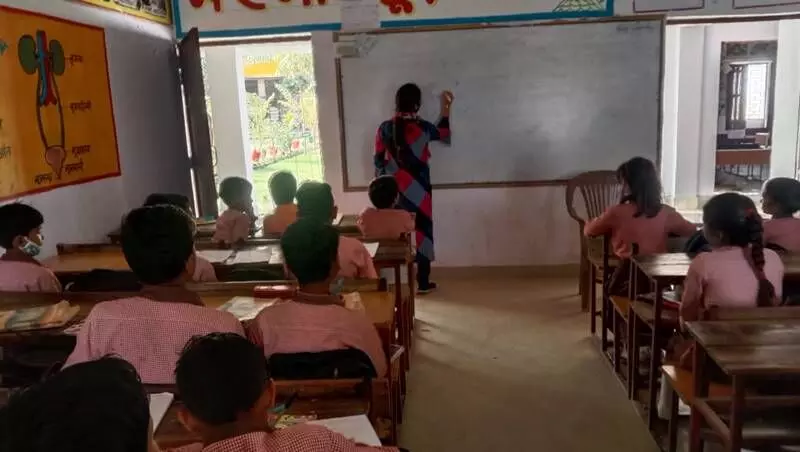Karpiya village (Barabanki), Uttar Pradesh
It is a school where the students learn from Nature. The premises of the Composite Vidyalaya that is located in Karpiya village is filled with rare herbs, trees and other flora that is gradually disappearing from people’s memories and indeed from the planet. Most of them are now found only in the pages of books.
But, in this school located in Masauli Block, Barabanki, Uttar Pradesh, the students are surrounded by the bounty of Nature where they learn about her first hand.
“I came to this school in 2016. At that time there were piles of debris lying everywhere, the school had no boundary walls and there was no proper space to teach the kids let them do physical activities,” Avdesh Kumar Pandey, the principal of the school, told Gaon Connection. In 2016, there were just 90 children in the school. Today there are 360, he added.
“I wanted to make the ambience of the school such that when the children came here they would experience something pleasant. Along with the pradhan of the village, we first made a boundary wall,” Pandey said.
Also Read: The ‘Jadui Pitara’ Works its Magic in the Classroom
Once the premises of the school were secured with the wall, it was decided that a garden would be created with all those plants that were slowly disappearing. There are medicinal plants such as Bringhraj, aloevera, safflower, Indian gooseberry, Kalmegh, bay leaves, black cardamom, cinnamon, and so on.
Some of the plants that are in danger of disappearing altogether such as Rudraksh, Mahogany, Seeta Sinduri, red and white sandalwood are also growing there.
“These are plants that are a part and parcel of our traditions and culture and which are now only found in textbooks. So we planted them here. So that the students could see them for themselves, touch and experience those plants,” the principal said. “The walls of our school are covered with images of the giants of the scientific world, so that the children can get inspiration wherever they turn,” he added.
According to the principal, the effort is on to reconnect the children with old traditions and Indian culture and acquaint them with those flowers, shrubs and fruits that are used in religious rituals.
“We study about plants in our textbooks and when we come out of the classrooms and can see for ourselves the very plant in our gardens, we learn so much more about it,” Riya, a class six student of Composite Vidyalaya, told Gaon Connection.
Ankit Singh, a class four student is full of wonder about the medicinal plants in his school garden. “Our teachers taught us about the importance of the medicinal plants and even showed us what they looked like as we have them in our school premises. Even the most difficult lesson becomes easy to understand and remember when we are taught this way,” Ankit told Gaon Connection.

According to the principal, the effort is on to reconnect the children with old traditions and Indian culture and acquaint them with those flowers, shrubs and fruits that are used in religious rituals.
Benefits of TLM
The school teachers impart education using teaching learning materials (TLM) which has improved class engagement, Pandey said.
“We have tried to do something original and different from what has been done for years in education,” Sanjay Kumar Srivastava, another teacher at the school, told Gaon Connection.
“Earlier we would just tell the students to write an essay or learn a concept by rote and so forth and we would tick them off if they did not do it. Not any more,” Srivastava said.
Also Read: A teacher holds ‘exclusive’ classes to educate rural girls about menstrual hygiene
Now along with the regular completion of syllabus etc., teachers are encouraging the children to be more observant. “For example, when the children set out for the school from their homes, we ask them to write down what all they saw on their way here, and what they learnt that day. They write those down and drop them in a chest in school that we have made for that very purpose,” Srivastava explained.
The TLM has worked wonders, the teachers said and they claim they can see a tangible improvement in their students.



















